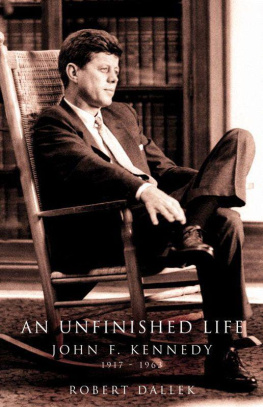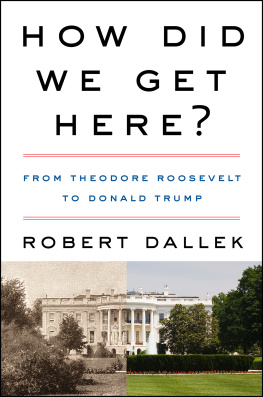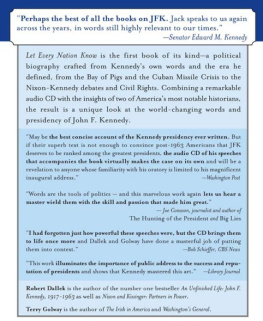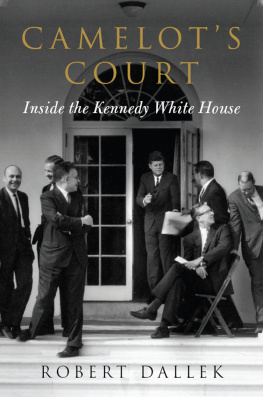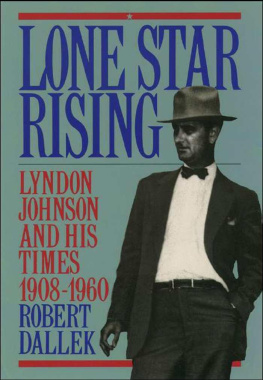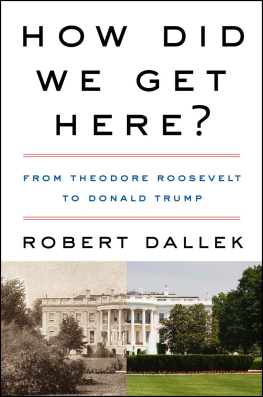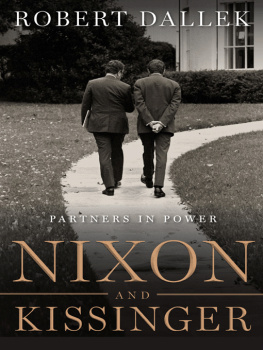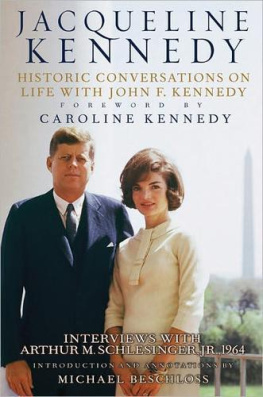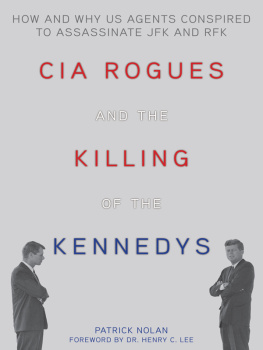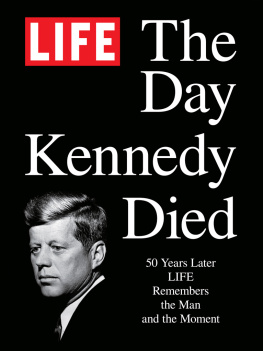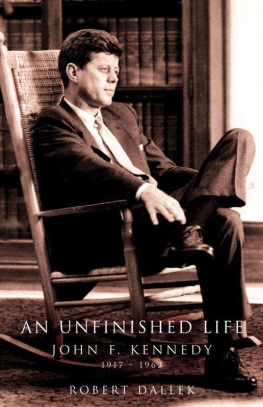Copyright 2003 by Robert Dallek
All rights reserved. No part of this book may be reproduced in any form or by any electronic or mechanical means, including information storage and retrieval systems, without permission in writing from the publisher, except by a reviewer who may quote brief passages in a review.
First eBook Edition: May 2003
ISBN: 978-0-7595-2828-4
Contents Also by Robert Dallek Flawed Giant: Lyndon Johnson and His Times, 1961-1973 Hail to the Chief: The Making and Unmaking of American Presidents Lone Star Rising: Lyndon Johnson and His Times, 1908-1960 The Great Republic: A History of the American People, Volume 2 (with Bernard Bailyn, David B. Davis, David H. Donald, John L. Thomas, and Gordon S. Wood) Ronald Reagan: The Politics of Symbolism The American Style of Foreign Policy: Cultural Politics and Foreign Affairs Franklin D. Roosevelt and American Foreign Policy, 1932-1945 Democrat and Diplomat: The Life of William E. Dodd To Len and Myra Dinnerstein, Larry Levine, and Dick Weissforty-seven years of fond memories and to Jeff Kelmanmy instructor in medicine Think where mans glory most begins and ends, And say my glory was I had such friends. William Butler Yeats
Why another Kennedy book? I was asked repeatedly during the five years I worked on this biography. The availability of new materialswritten contemporary documents, telephone and Oval Office tapes, and entire oral histories or parts thereofseemed ample reason to revisit Kennedys personal and public lives. I also took guidance from science writer Jacob Bronowski: Ask an impertinent question and you are on your way to a pertinent answer. As I worked my way through the records, I was startled by how many fresh things could be said based on the combination of old and new files about the man, his family, and his political career. To cite just a few examples, new documents reveal more clearly the cause of the accident that killed Joseph Kennedy Jr. in World War II, how Bobby Kennedy became attorney general in 1960, and what JFK thought of U.S. military chiefs, their plans for an invasion of Cuba, the American press corps in Saigon, and the wisdom of an expanded war in Vietnam.
As with all our most interesting public figures, Kennedy is an elusive character, a man who, like all politicians, worked hard to emphasize his favorable attributes and hide his limitations. He and those closest to him were extraordinarily skillful at creating positive images that continue to shape public impressions. My objective has not been to write another debunking book (these have been in ample supply in recent years) but to penetrate the veneer of glamour and charm to reconstruct the real man or as close to it as possible. The result is not a sharply negative portrait but a description of someone with virtues and defects that make him seem both exceptional and ordinarya man of uncommon intelligence, drive, discipline, and good judgment on the one hand, and of lifelong physical suffering and emotional problems on the other. I have not emphasized one aspect over the other but have tried to bring them into balance. Learning, for example, a great deal more than any biographer has previously known about Kennedys medical history allowed me to see not only the extent to which he hid his infirmities from public view but also the mans exceptional strength of character. In addition, I have tried to understand his indisputable womanizing, including previously unknown instances of his compulsive philandering. More significant, I have ventured answers to questions about whether his health problems and behavior in any way undermined his performance of presidential duties.
I have also tried to judiciously assess the negative and positive family influences on his character, the record of his navy service, his House and Senate careers, and, most important, his presidential policies on the economy, civil rights, federal aid to education, health insurance for seniors, and poverty, and, even more consequentially, on dealings with Russia, nuclear weapons, space, Cuba, and Vietnam. I have not hesitated to say what I believe Kennedy might have done about the many ongoing problems certain to have faced him in a second term, however open to question these conclusions may be. It is better to debate a question without settling it than to settle a question without debating it, said Joseph Joubert, a French philosopher of the eighteenth and nineteenth centuries.
I believe this biography provides the most authoritative discussion to date on Kennedy the man and his political career. Nonetheless, however much it may be a significant advance in understanding, I have no illusion that I am recording the last word on John F. Kennedy. The economist Thorstein Veblen was surely right when he cautioned that the outcome of any serious research can only be to make two questions grow where one question grew before. Add to this the mans almost mythical importance to Americans and hundreds of millions of people around the globe and you can be certain that future generations will be eager for renewed attention to him in the context of their own times.
R.D.
February 2003 Growing Up Every man had to test himself, and if he was courageous and lucky he found maturity. That was all the reward you could ask for, or were entitled to: growing up. Ward Just, The Translator (1991) Beginnings George Bernard Shaw, speaking as an Irishman, summed up an approach to life:... I dream things that never wereand I say: Why not? John F. Kennedy before the Irish Parliament, June 28, 1963
IN AUGUST 1947 , John F. Kennedy traveled to Ireland. The trip was notable for several reasons. Kennedy was first and foremost a good New Englander, an Americanso said the Irish ambassador to the United Stateswho had all but lost his connection to the old country. Indeed, recalling how often Jack Kennedy had visited England in the 1930s and early 1940s without going to Ireland, the ambassador archly described Kennedy as an English American. Many people made much of his Irish ancestry, one of Kennedys English friends said. But he was a European... more English than Irish. Now, at long last, he was going home. That was not, however, how his father saw it. For Joseph Patrick Kennedy, whose drive for social acceptance shadowed most of what he did, being described as an Irishman was cause for private rage. Goddamn it! he once sputtered after a Boston newspaper identified him that way. I was born in this country! My children were born in this country! What the hell does someone have to do to become an American?
But his son had if not formed a deep emotional attachment, at least taken his cue from his mothers father, John F. Fitzgerald. There seems to be some disagreement as to whether my grandfather Fitzgerald came from Wexford, Limerick or Tipperary, Kennedy would later recall. And it is even more confusing as to where my great[-]grandmother came frombecause her sonwho was the Mayor of Bostonused to claim his mother came from whichever Irish county had the most votes in the audience he was addressing at that particular time. And indeed, when the twenty-nine-year-old had first run for Congress the year before, Irish Americans in his district had been hesitant to support Kennedy because of his lack of ethnic identification, let alone pride.
Officially, Kennedy was on a fact-finding mission to study the potential workings of the Marshall Plan in a Europe still reeling from the devastation wrought by the Second World War. Unofficially, it was a chance to relax with Kathleen Kennedy Hartington, Jacks favorite younger sister, who was even more English American than he was. Though her husband, William Cavendish Hartington, who was in line to become the next duke of Devonshire, had died in the war, Kathleen had stayed in England, where the Devonshires treated her with fond regard. They gave her free run of their several great estates, including Lismore Castle in southern Irelands County Waterford, a twelfth-century mansion once owned by Sir Walter Raleigh. Kathleen called it the most perfect place in the world.
Next page
